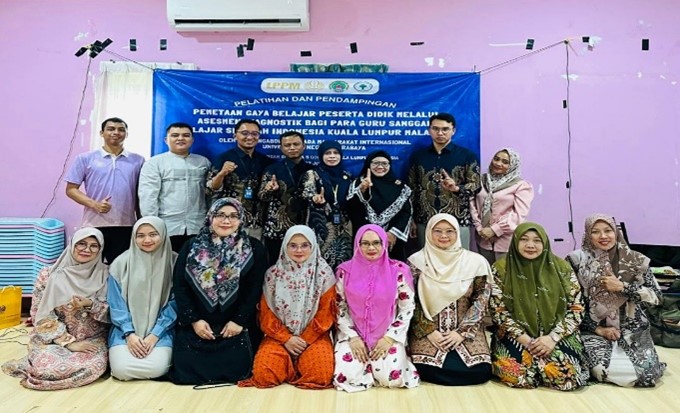Pelatihan dan Pendampingan Pemetaan Gaya Belajar Peserta Didik Melalui Asesmen Diagnostik bagi Para Guru Sanggar Belajar Sekolah Indonesia Kuala Lumpur Malaysia
##plugins.themes.academic_pro.article.main##
Abstract
Asesmen diagnostik merupakan syarat penting dalam melaksanakan pembelajaran berdiferiensi. Namun, semua guru di Sanggar Belajar Sungai Mulia 5 belum memahami dan menerapkanya sebelum melakukan pembelajaran. Kegiatan pelatihan dan pendampingan ini bertujuan untuk peningkatan pedagogik guru di Sanggar Belajar Sungai Mulia 5. Kegiatan ini diikuti oleh 11 yang merupakan TKI yang bekerja di Malaysia. Adapun metode kegiatan pendampingan ini meliputi; presentasi, diskusi, tanya jawab, praktik. Sementara, kegiatan pelatihan dan pendampingan ini meliputi beberapa tahapan, diantaranya; (1) tahap inisiasi/persiapan, (2) tahap pelaksanaan/pendampingan, dan (3) tahap pasca-pelatihan/pendampingan. Hasil pretes dan postes peserta pelatihan dan pendampingan menunjukan adanya peningkatan pemahaman materi dari 45,6 menuju 64,5 . Selain itu, hasil feedback peserta pendampingan menunjukkan bahwa materi pelatihan sangat sesuai dengan kebutuhan peserta pendampingan dan metode yang digunakan saat pendampingan sangat efektif.
##plugins.themes.academic_pro.article.details##

This work is licensed under a Creative Commons Attribution-NonCommercial 4.0 International License.
JURPIKAT (Jurnal Pengabdian Kepada Masyarakat) accepts manuscripts that have not been published elsewhere and are not under consideration for publication by other print or electronic media. Authors retain copyright and grant the journal right of first publication with the work simultaneously licensed under a Creative Commons BY-NC License that allows others to share the work with an acknowledgment of the work's authorship and initial publication in this journal.
Authors are able to enter into separate, additional contractual arrangements for the non-exclusive distribution of the journal's published version of the work (eg, post it to an institutional repository, in a journal or publish it in a book), with an acknowledgment of its initial publication in this journal.
License to Publish
The non-commercial use of the article will be governed by the Attribution-NonCommercial 4.0 International (CC BY-NC 4.0). The author hereby grants JURPIKAT (Jurnal Pengabdian Kepada Masyarakat) an exclusive publishing and distribution license in the manuscript include tables, illustrations or other material submitted for publication as part of the manuscript (the “Articleâ€) in print, electronic and all other media (whether now known or later developed), in any form, in all languages, throughout the world, for the full term of copyright, and the right to license others to do the same, effective when the article is accepted for publication. This license includes the right to enforce the rights granted hereunder against third parties.
References
Azis, A. C. K., & Lubis, S. K. (2023). ASESMEN DIAGNOSTIK SEBAGAI PENILAIAN PEMBELAJARAN DALAM KURIKULUM MERDEKA DI SEKOLAH DASAR. Pena Anda: Jurnal Pendidikan Sekolah Dasar, 1(2), 20–29. https://doi.org/10.33830/penaanda.v1i2.6202
Bernard, J., Chang, T.-W., Popescu, E., & Graf, S. (2017). Learning style Identifier: Improving the precision of learning style identification through computational intelligence algorithms. Expert Systems with Applications, 75, 94–108. https://doi.org/10.1016/j.eswa.2017.01.021
Bernard, J., Popescu, E., & Graf, S. (2022). Improving online education through automatic learning style identification using a multi-step architecture with ant colony system and artificial neural networks. Applied Soft Computing, 131, 109779. https://doi.org/10.1016/j.asoc.2022.109779
Childs-Kean, L., Edwards, M., & Smith, M. D. (2020). Use of Learning Style Frameworks in Health Science Education. American Journal of Pharmaceutical Education, 84(7), ajpe7885. https://doi.org/10.5688/ajpe7885
Deng, R., Benckendorff, P., & Gao, Y. (2022). Limited usefulness of learning style instruments in advancing teaching and learning. The International Journal of Management Education, 20(3), 100686. https://doi.org/10.1016/j.ijme.2022.100686
Garber, L. L., Hyatt, E. M., & Boya, Ü. Ö. (2017). Gender differences in learning preferences among participants of serious business games. The International Journal of Management Education, 15(2), 11–29. https://doi.org/10.1016/j.ijme.2017.02.001
Garizábalo-Dávila, C., Ospino-Mendoza, E., Marin-Hamburger, Y., Arrieta-Reales, N., Díaz-Arroyo, E., & Marina-Rueda, A. (2024). An Empirical Analysis of Learning Styles and Generic Competencies in University Students: Case of Health Services Administration Students in the City of Barranquilla, Colombia. Procedia Computer Science, 231, 623–628. https://doi.org/10.1016/j.procs.2023.12.174
Knoll, A. R., Otani, H., Skeel, R. L., & Van Horn, K. R. (2017). Learning style, judgements of learning, and learning of verbal and visual information. British Journal of Psychology, 108(3), 544–563. https://doi.org/10.1111/bjop.12214
Lyle, K. B., Young, A. S., Heyden, R. J., & McDaniel, M. A. (2023). Matching learning style to instructional format penalizes learning. Computers and Education Open, 5, 100143. https://doi.org/10.1016/j.caeo.2023.100143
Martínez Martínez, I., Renés Arellano, P., & Martínez Geijo, P. (2019). estilos de aprendizaje y de enseñanza: análisis y diagnóstico en educación superior de centro internacional de estudios superiores del español, CIESE-Comillas (España). Revista de Estilos de Aprendizaje, 12(24), 28–41. https://doi.org/10.55777/rea.v12i24.1317
Muhammad, B. A., Qi, C., Wu, Z., & Ahmad, H. K. (2024). An evolving learning style detection approach for online education using bipartite graph embedding. Applied Soft Computing, 152, 111230. https://doi.org/10.1016/j.asoc.2024.111230
Newton, P. M., & Miah, M. (2017). Evidence-Based Higher Education – Is the Learning Styles ‘Myth’ Important? Frontiers in Psychology, 8. https://doi.org/10.3389/fpsyg.2017.00444Papadatou-Pastou, M., Touloumakos, A. K., Koutouveli, C., & Barrable, A. (2021). The learning styles neuromyth: when the same term means different things to different teachers. European Journal of Psychology of Education, 36(2), 511–531. https://doi.org/10.1007/s10212-020-00485-2
Rachman, F., Taufika, R., Kabatiah, M., Batubara, A., Pratama, F. F., & Nurgiansah, T. H. (2021). Pelaksanaan Kurikulum PPKn pada Kondisi Khusus Pandemi Covid-19. Jurnal Basicedu, 5(6), 5682–5691. https://doi.org/10.31004/basicedu.v5i6.1743
Suarni, S. (2023). Implementasi Asesmen Diagnostik Dalam Kurikulum Merdeka Pada Mata Pelajaaran Bahasa Inggris Kelas Xi/Fase F Di Madrasah Aliyah Negeri Kota Sorong. Jurnal Keguruan Dan Ilmu Pendidikan (JKIP), 1(4), 263–270. https://doi.org/10.61116/jkip.v1i4.188
Tocci, A. M. (2015). Caracterización de perfiles de estilos de aprendizaje en alumnos de Ingeniería según el modelo de Felder y Silverman. Revista de Estilos de Aprendizaje, 8(16). https://doi.org/10.55777/rea.v8i16.1019

